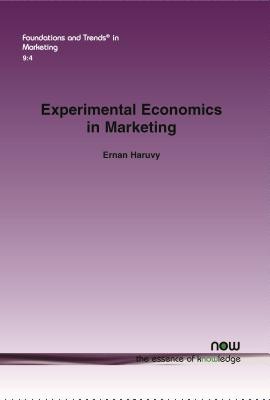
- We will send in 10–14 business days.
- Author: Ernan Haruvy
- Publisher: Now Publishers
- ISBN-10: 1680831666
- ISBN-13: 9781680831665
- Format: 15.6 x 23.4 x 0.4 cm, minkšti viršeliai
- Language: English
- SAVE -10% with code: EXTRA
Reviews
Description
As experimental economics methods grow in prominence in marketing research, marketing researchers increasingly evolve experimental economics further, adding marketing flavors and theories, introducing new problems, discussing new ways of looking at old problems, and bringing in complementary experimental practices from consumer research. However, it can be difficult to narrowly or precisely define experimental economics in marketing, given that different researchers have very different viewpoints and backgrounds. Despite the many viewpoints, marketing researchers employing experimental economics methods agree on what experimental economics is not - it is not behavioral economics and it is not experimental consumer research - although it benefits greatly from both. Experimental Economics in Marketing has a set of goals to help the reader understand the role of experimental economics in marketing. These include: (1) Distinguishing experimental economics from other fields in the broadest possible terms; (2) providing the basic methodological tenets of experimental economics; (3) delineating classes of experiments within experimental economics; (4) highlighting important topics in experimental economics research in marketing; (5) highlighting best practices in marketing; and (6) explaining the benefits of experimental economics to marketers. The main benefit to marketers from knowing the methodology of experimental economics is that it opens up a new world of empirical research possibilities. It allows analytical marketing theorists to empirically test or demonstrate their theories and propositions in the environment for which they were meant, without the need to seek real-world data sets that correspond exactly to the theory. It allows marketers to design and test mechanisms that may not yet exist, and therefore have no corresponding real-world data. It allows behavioral marketing researchers to ask and experimentally test questions that are not restricted to the consumer--by bringing experiments to the realm of strategic decision makers and competitive interaction. It allows for the mixing of behavioral insights with game theoretic analysis. It allows for econometric analysis of human behavior that can focus more on strategic behavior and less on the econometric modeling the surrounding environment. It allows for abstraction from contextual cues and a narrower focus on incentives. In short, experimental economics as a body of methodology is not superior to existing experimental methodologies in marketing but opens up an entire new world of questions that can be investigated in the lab or the field.
EXTRA 10 % discount with code: EXTRA
The promotion ends in 22d.04:06:17
The discount code is valid when purchasing from 10 €. Discounts do not stack.
- Author: Ernan Haruvy
- Publisher: Now Publishers
- ISBN-10: 1680831666
- ISBN-13: 9781680831665
- Format: 15.6 x 23.4 x 0.4 cm, minkšti viršeliai
- Language: English English
As experimental economics methods grow in prominence in marketing research, marketing researchers increasingly evolve experimental economics further, adding marketing flavors and theories, introducing new problems, discussing new ways of looking at old problems, and bringing in complementary experimental practices from consumer research. However, it can be difficult to narrowly or precisely define experimental economics in marketing, given that different researchers have very different viewpoints and backgrounds. Despite the many viewpoints, marketing researchers employing experimental economics methods agree on what experimental economics is not - it is not behavioral economics and it is not experimental consumer research - although it benefits greatly from both. Experimental Economics in Marketing has a set of goals to help the reader understand the role of experimental economics in marketing. These include: (1) Distinguishing experimental economics from other fields in the broadest possible terms; (2) providing the basic methodological tenets of experimental economics; (3) delineating classes of experiments within experimental economics; (4) highlighting important topics in experimental economics research in marketing; (5) highlighting best practices in marketing; and (6) explaining the benefits of experimental economics to marketers. The main benefit to marketers from knowing the methodology of experimental economics is that it opens up a new world of empirical research possibilities. It allows analytical marketing theorists to empirically test or demonstrate their theories and propositions in the environment for which they were meant, without the need to seek real-world data sets that correspond exactly to the theory. It allows marketers to design and test mechanisms that may not yet exist, and therefore have no corresponding real-world data. It allows behavioral marketing researchers to ask and experimentally test questions that are not restricted to the consumer--by bringing experiments to the realm of strategic decision makers and competitive interaction. It allows for the mixing of behavioral insights with game theoretic analysis. It allows for econometric analysis of human behavior that can focus more on strategic behavior and less on the econometric modeling the surrounding environment. It allows for abstraction from contextual cues and a narrower focus on incentives. In short, experimental economics as a body of methodology is not superior to existing experimental methodologies in marketing but opens up an entire new world of questions that can be investigated in the lab or the field.


Reviews